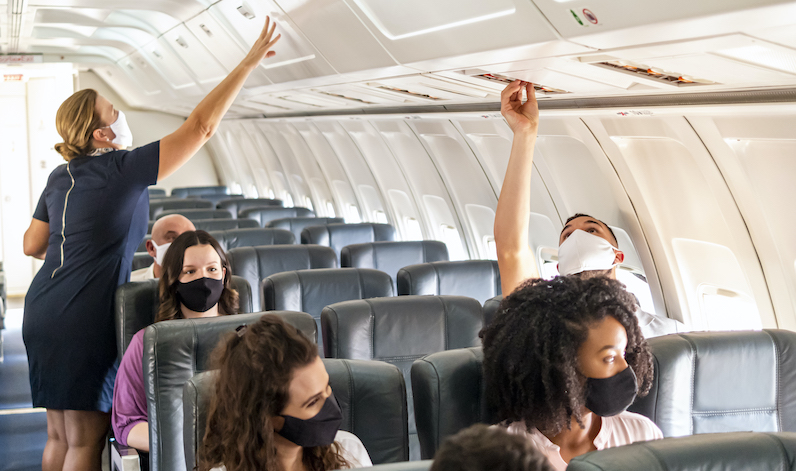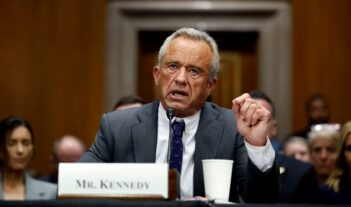
A federal judge rules CDC cannot require travelers to wear masks on airplanes or public transportation.
Last week, a federal judge struck down the federal government’s mask mandate that applied to travelers on public transportation and airplanes.
In a recent ruling, Judge Kathryn Kimball Mizelle concluded that the mask mandate was invalid because the Centers for Disease Control & Prevention (CDC) exceeded its legal authority to prevent the interstate spread of communicable disease.
Shortly after President Joseph R. Biden was inaugurated, he directed officials at various federal agencies to require masks for travelers on public transportation and airplanes through Executive Order 13998. In February 2021, the CDC published a notice of agency order requiring masks in transportation hubs such as airports, train stations, and bus terminals, and on public transit, ride shares, and commercial airplanes.
The CDC’s order—which was issued as an emergency action—flows through section 264(a) of the Public Health Service Act of 1944 (PHSA), which grants the CDC the power to prevent the interstate spread of communicable disease. The agency further argued that the requirement was a “reasonable and necessary measure to prevent the introduction, transmission, and spread of COVID-19” and that it had acted within the scope of power granted to it by the U.S. Congress.
In siding against the CDC, Judge Mizelle held that the agency had adopted an overly broad interpretation of its scope of power granted by Congress.
Although section 264(a) grants the agency the power to issue necessary regulations to curb the spread of communicable disease, the judge noted that the text of the law restricts the CDC’s available avenues for doing so to “inspection, fumigation, disinfection, sanitation, pest extermination, and destruction of contaminated animals and articles, and other measures.”
Previously, the government had argued that “sanitation” means measures intended for “the promotion of hygiene and prevention of disease,” so the CDC’s mask mandate was appropriate under this definition. The judge rejected this argument and instead concluded that masking was distinct from sanitation, despite also citing dictionary references that define sanitation as “the use of sanitary measures to preserve health.”
Judge Mizelle also rejected the government’s alternative argument that the law’s mention of “other measures” refers to avenues “for preserving and promoting public health.” She concluded that if Congress had intended for the CDC to have the power to implement any public health measure, the agency would not only be permitted to impose mask mandates but also be allowed to require individuals to cough into elbows or consume daily multivitamins.
As evidence that section 264(a) is “rarely invoked” and “generally limited to quarantining infected individuals and prohibiting the import or sale of animals known to transmit disease,” the judge also cited two recent instances of the CDC invoking the same section during the pandemic to influence individual behavior.
In one instance, the agency put a pause on the cruise ship industry to curb the spread of the virus. In another, the CDC enacted the federal eviction moratorium to prevent landlords from evicting renters from their homes. Both of these CDC policies, Judge Mizelle noted, were recently rejected by other courts as measures exceeding the CDC’s statutory authority under section 264(a).
The Biden Administration expressed disappointment in Judge Mizelle’s decision, but announced that it would appeal the ruling. Because the decision may have significant implications for federal agency authority, the White House noted that the appeal will focus on ensuring that “public health experts are able to take steps, if needed, in the future.”
Changes following the decision, however, are already in motion. The Transportation Security Administration has stopped enforcing the mask mandate even though the CDC continues to recommend that travelers wear masks in enclosed transportation settings.
Although the opinion allows airlines and state transit authorities to decide independently how to proceed with mask mandates, major airlines across the country suspended their requirements hours after the decision. Public transit authorities in New Jersey, Philadelphia, Chicago, and Washington, D.C. also followed suit by lifting their mandates.
Following the decision, many public health experts voiced concerns. In particular, these experts fear that what took place earlier this year in the United Kingdom—where a drastic rollback of restrictions resulted in a dramatic surge of new COVID-19 cases—could also occur in the United States.
Others, however, celebrated the decision. Airline crew members, for example, were relieved to be free of tensions with noncompliant passengers. Some travelers erupted into cheers at airports and midflight immediately following the ruling.
Whether the celebrations continue may depend on what happens to the case on appeal. Public health experts worry that if Judge Mizelle’s ruling is heard by a conservative-leaning panel of judges on the 11th Circuit Court of Appeals, the case could limit the CDC’s ability to take similar actions in the future.



